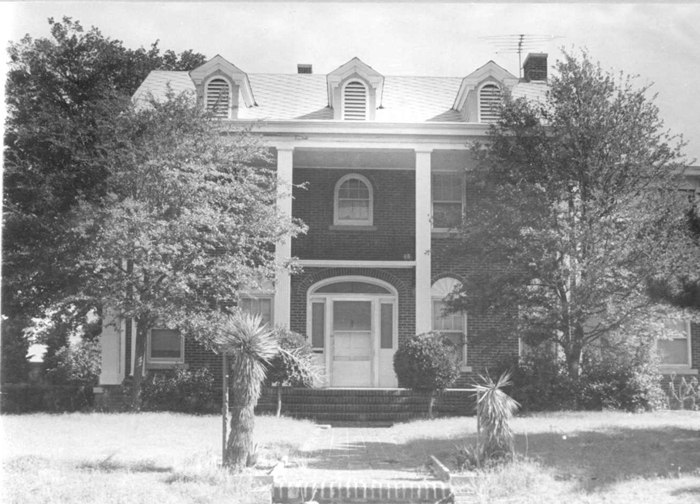623 N.E. 18th Street

The house at 623 is a red brick colonial with four columned two-story porch house. Its gabled roof has three Dormers with round-headed louvers. The first floor windows have arched heads, and the door has a wrought iron railing overhead. There is a wing on the side which has a flat roof over the second story sunroom and a porte-cochere underneath leading to the garages behind.
Harry Pentecost 1930-31
Dr. Oliver O. Hammonds 1932-62
B.J. Theimer 1962-69
Roger Wolf 1969-73
Larry Joplin 1973 -
Harry Pentecost was an investor.
Dr. Hammonds was Commissioner of Health under Governor Henry S. Johnston, who was outsted by an impeachment-minded legislature on March 20, 1929, on a charge of general incompetence.
But it was Hammonds' wife who made Oklahoma history. As Johnston's confidential secretary, Mrs. Hammonds' allegedly high-handed methods precipitated what has become known in Oklahoma lore as the "ewe lamb rebellion." Mrs. Hammonds was the "ewe lamb" and this is how it happened:
Johnston was elected in 1926, and was hardly in office before he called out the National Guard to prevent the legislature from meeting in rump session to impeach him. As an activist in the Ku Klux Klan, the governor had met Mrs. Hammonds when she was in the Klamelia, the women's auxiliary to the Klan. She helped in his campaign for governor and as his personal secretary become a power in his office, the governor's enemies picturing her as the "power behind the throne."
As Otis Sullivant, longtime political writer for the Daily Oklahoman wrote upon Johnston's death in 1965: "She controlled the door to the governor. Legislators, friends, and supporters of the governor found themselves unable to see the governor unless she acquiesced."
Johnston was burdened not only by the storm around Mrs. Hammonds, but also by his interest in Rosicrucianism, which was fostered by Mrs. Hammonds uncle, James R. Armstrong, who became one of the governor's chief political advisors. Although the mysticism issue did not have a direct bearing on his impeachment, the anger over Johnston's interest in the occult contributed to the atmosphere of suspicions about his competence as governor.
Johnston's serious troubles began in the autumn of 1927 when the legislature attempted to convene itself to impeach. Four house members, dubbed the "four horsemen", got a petition signed by more than half the House requesting Johnston to convene the legislature, but he refused, saying he would not be fooled by "Chicanery." Although the State Supreme Court ultimately ruled that the legislature did not have the right to convene itself in special session without the call of the Governor, both the Senate and House convened in December 1927, as the political storm clouds grew.
Since Mrs. Hammonds figured prominently in the furor over Johnston, reporters at a press converence asked the governor if he would consider discharging her. Johnston said he would not let her go as the price of immunity from impeachment, and then illustrated his position with the parable that spawned the "ewe lamb" headlines.
As recounted by Mr. Sullivant, "Johnston thanked reporters for bringing the subject up. He shoved his hands deep into his pants pockets, stared out the window toward where the executive mansion now stands (Johnston was the first governor to reside in it)... and he said:
'If you came to me with a thousand sheep, and I had only one ewe lamb and you wanted me to destroy that, do you think I would be so base as to destroy it? I repeat, gentlemen, it would be yellow, it would be unjust to Mrs. Hammonds to sacrifice her and her character on false charges."
The legislature went ahead and drew up articles of impeachment, but meanwhile the Supreme Court held the legislature had no right to be meeting, and on December 12th, Johnston called out the National Guard to disperse the lawmakers from the capitol.
The news story put this epitaph on the Ewe Lamb Rebellion: "Unhorsed, unhonored, unpaid and hamstrung, the rebel leaders and insurrectionists returned to their home." But in 1929, the legislature finally outsted him at its next regular session. Mrs. Hammonds' belated resignation during the ouster trial came too late to stem the tide.
B.J. Theimer owned real estate (ranches) and independent oil holdings.
Roger Wolf was a movie film producer for the University of Oklahoma Medical Center, specializing in health education films.
Larry Joplin was an attorney with Bohanon and Barth.